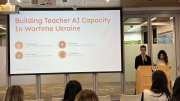The academic year ended with two important matters affecting undergraduates’ Harvard lives—intellectual and social—left very much pending.
At its April 4 meeting, the Faculty of Arts and Sciences (FAS) discussed a reconceived empirical and mathematical reasoning requirement under the revised undergraduate Program in General Education, which takes effect in the fall of 2018—and introduced a new Harvard acronym, TwD, for “Thinking with Data,” reflecting a bent toward data science (see harvardmag.com/mathreq-17).
Dean of undergraduate education Jay M. Harris presented the report of the committee charged with refining the course, which asserted that all Harvard undergraduates “should be able to understand, interpret, and manipulate the data they will encounter in their lives beyond the University, as well as comprehend the basic quantitative concepts that are essential to many academic disciplines, across all the divisions.” The proposed “arc” of the required course options envisioned five actions students would take in learning to work with data: “‘Ask, Get, Analyze, Iterate, and Communicate’ with consideration of ethical issues embedded in each step.” Harris asked that an implementation committee be authorized to proceed.
But faculty members raised several concerns. Those in mathematics, engineering, and applied sciences (including applied mathematics) found the proposal too focused on data science at the expense of math, logic, and related disciplines. Some speakers worried that finding nearly 1,700 seats annually might prove infeasible, particularly when nearly half of entering students each year require extra help in entry-level calculus. Among the issues are who will teach (faculty members, or adjuncts or preceptors, as in Expository Writing), and whether sufficiently skilled teachers could be hired at a time of fiscal constraint.
Harris therefore withdrew the motion at the May 2 FAS meeting, pending further discussion with the mathematicians and refinement of the proposal. Presumably, the issues will return this fall—making for a sprint to the following academic year, when students begin selecting courses to fulfill their new gen-ed requirements.








